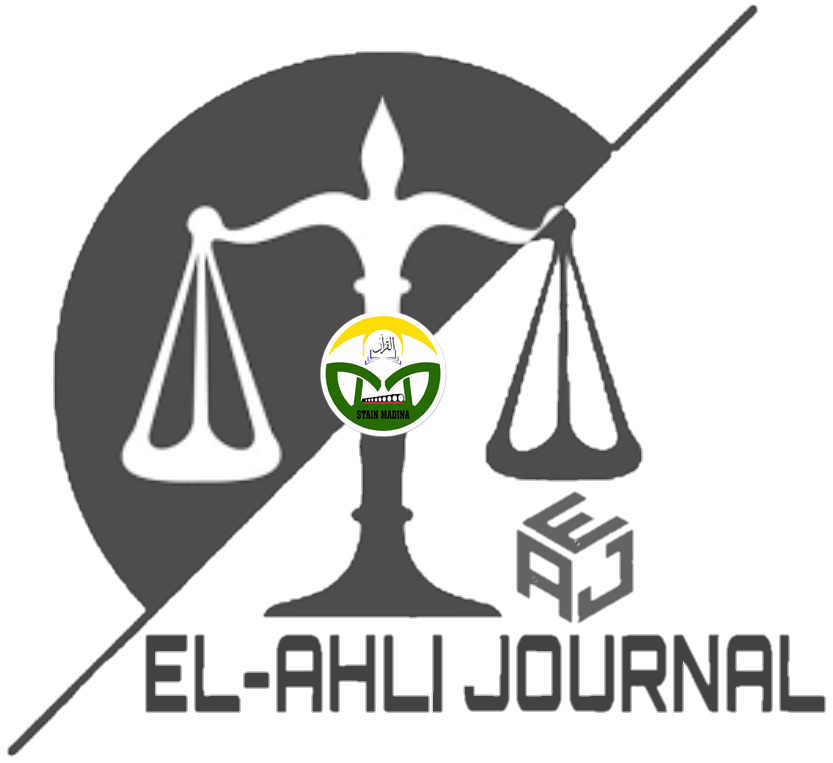TEKNOLOGI AI DALAM MEMPERKAYA INTERPRETASI DAN PEMAHAMAN FIQH SEBAGAI REVOLUSI METODOLOGI
DOI:
https://doi.org/10.56874/el-ahli.v5i1.1989Keywords:
Fiqh, Islamic Family Law, Artificial Intelligence (AI), Digital RevolutionAbstract
The digital revolution in Islamic studies, especially Fiqh, marks a new era in understanding and interpreting Islamic law through Artificial Intelligence (AI) technology. In Islamic Family Law, the challenges of interpreting and applying law in a dynamic socio-cultural context require innovative research methodologies. This study fills the knowledge gap by integrating AI into Fiqh methodology, providing a new perspective in addressing contemporary issues in Islamic Family Law. Using qualitative and descriptive-analytical approaches, this study combines analysis of Islamic legal norms with empirical observations of AI applications, analyzing data from journal reviews, documentation, and literature. The results show that AI can identify patterns and themes in relevant Islamic legal texts, facilitating more dynamic and evidence-based interpretations, and paving the way for a broader understanding of legal principles in the context of modern life. The implications for theory and practice in Islamic Family Law are significant, encouraging integration between Islamic legal tradition and technological innovation, and offering more adaptive solutions to evolving issues in Islamic Family Law. This study suggests the development of AI algorithms that are more sensitive to socio-cultural contexts and expanding the database for analysis as future research directions.
References
Alaverdov, T. (2022). Comparative analysis of legalsocio studies of muslims family according to islamic family law. In Regulating Human Rights, Social Security, and Socio-Economic Structures in a Global Perspective (pp. 18–32). IGI Global; Scopus. https://doi.org/10.4018/978-1-6684-4620-1.ch002
An-Na’im, A. A. (2019). The postcolonial fallacy of ‘Islamic’ family law. In The Cambridge Companion to Comparative Family Law (pp. 254–279). Cambridge University Press; Scopus. https://doi.org/10.1017/9781316711750.011
Arif Royyani, M., Mufid, A., Ni’am, M. I., Azizi, A. Q., & Abidin, A. A. (2021). Shahadah ’Ilmy; Integrating Fiqh and Astronomy Paradigm in Determining The Arrival of Lunar Months in Indonesia. Al-Ihkam: Jurnal Hukum Dan Pranata Sosial, 16(2), 503–524. Scopus. https://doi.org/10.19105/AL-LHKAM.V16I2.5320
Barkah, Q., Huzaimah, A., Rachmiyatun, S., & Ramdani, Z. (2022). Abandonment of Women’s Rights in Child Marriage; An Islamic Law Perspective. Al-Ihkam: Jurnal Hukum Dan Pranata Sosial, 17(2), 383–411. Scopus. https://doi.org/10.19105/al-Ihkam.v17i2.6725
Dwivedi, Y. K., Hughes, L., Ismagilova, E., Aarts, G., Coombs, C., Crick, T., Duan, Y., Dwivedi, R., Edwards, J., Eirug, A., Galanos, V., Ilavarasan, P. V., Janssen, M., Jones, P., Kar, A. K., Kizgin, H., Kronemann, B., Lal, B., Lucini, B., … Williams, M. D. (2021). Artificial Intelligence (AI): Multidisciplinary perspectives on emerging challenges, opportunities, and agenda for research, practice and policy. International Journal of Information Management, 57. Scopus. https://doi.org/10.1016/j.ijinfomgt.2019.08.002
Fadel, M. H. (2011). Political liberalism, Islamic family law, and family law pluralism. In Marriage and Divorce in a Multicultural Context Multi-Tiered Marriage and the Boundaries of Civil Law and Religion (pp. 164–199). Cambridge University Press; Scopus. https://doi.org/10.1017/CBO9781139013789.011
Faisol, M. (2019). HUKUM ISLAM DAN PERUBAHAN SOSIAL. Juris: Jurnal Ilmiah Syariah, 18(1), 33–44. Scopus. https://doi.org/10.31958/juris.v18i1.1397
Fauziah, N. (2023). The Evaluation of Maqāṣid Asy-Syarī’ah on Discourses of the Islamic Family Law. El-Usrah, 6(1), 81–90. Scopus. https://doi.org/10.22373/ujhk.v6i1.13035
Gad Makhlouf, A. (2021). The Doctrinal Development of Contemporary Islamic Law: Fiqh Academies as an Institutional Framework. Oxford Journal of Law and Religion, 10(3), 464–486. Scopus. https://doi.org/10.1093/ojlr/rwac005
Habudin, I. (2019). DISKURSUS FEMINISME DALAM HUKUM KELUARGA ISLAM PADA SITUSWEB ISLAM DI INDONESIA: Respon Kelompok Islam Konservatif dan Islam Moderat. Al-Ahwal, 12(1), 99–116. Scopus. https://doi.org/10.14421/ahwal.2019.12108
Hamour, M., Shakil, M. H., Akinlaso, I. M., & Tasnia, M. (2019). Contemporary issues of form and substance: An Islamic law perspective. ISRA International Journal of Islamic Finance, 11(1), 124–136. Scopus. https://doi.org/10.1108/IJIF-01-2018-0006
Handayani, Y. (2021). ISLAMIC FAMILY LAW IN THE DIGITAL SPACE: Gender Bias in the Discourse of Family Law in Instagram. Al-Ahwal, 14(2), 112–132. Scopus. https://doi.org/10.14421/ahwal.2021.14201
Hanid, M. F. A., Mohamad Said, M. N. H., & Yahaya, N. (2020). Learning strategies using augmented reality technology in education: Meta-analysis. Universal Journal of Educational Research, 8(5 A), 51–56. Scopus. https://doi.org/10.13189/ujer.2020.081908
Harisudin, M. N. (2021). The formulation of Fiqh Nusantara in Indonesia. Ijtihad: Jurnal Wacana Hukum Islam Dan Kemanusiaan, 21(1), 39–57. Scopus. https://doi.org/10.18326/ijtihad.v21i1.39-57
Hayati, R. F. (2021). TRANSMISI HUKUM EKONOMI SYARIAH DI RUANG DIGITAL (KAJIAN TERHADAP AKUN INSTAGRAM @MUAMALAH_DAILY). Juris: Jurnal Ilmiah Syariah, 20(1), 19–33. Scopus. https://doi.org/10.31958/juris.v20i1.2903
HISTORY, TYPOLOGY, AND IMPLEMENTATION OF ISLAMIC LAW IN INDONESIA: Combination of Sharia and Fiqh or the Result of Historical Evolution? (2021). Al-Risalah: Forum Kajian Hukum Dan Sosial Kemasyarakatan, 21(1), 33–47. Scopus. https://doi.org/10.30631/alrisalah.v21i1.676
Janssen, M., Brous, P., Estevez, E., Barbosa, L. S., & Janowski, T. (2020). Data governance: Organizing data for trustworthy Artificial Intelligence. Government Information Quarterly, 37(3). Scopus. https://doi.org/10.1016/j.giq.2020.101493
Kasdi, A. (2019). Reconstruction of fiqh Nusantara: Developing the Ijtihad methodology in formulating fiqh from Indonesian perspective. Qudus International Journal of Islamic Studies, 7(2), 239–266. Scopus. https://doi.org/10.21043/qijis.v7i2.4797
Kitsios, F., & Kamariotou, M. (2021). Artificial intelligence and business strategy towards digital transformation: A research agenda. Sustainability (Switzerland), 13(4), 1–16. Scopus. https://doi.org/10.3390/su13042025
Kurniawan, E., & Najib, K. (2020). EARLY MARRIAGE, HUMAN RIGHTS, AND THE LIVING FIQH: A Maqāṣid al-Sharīʻa Review. Al-Risalah: Forum Kajian Hukum Dan Sosial Kemasyarakatan, 20(1), 1–15. Scopus. https://doi.org/10.30631/alrisalah.v20i1.565
Longoni, C., Bonezzi, A., & Morewedge, C. K. (2019). Resistance to Medical Artificial Intelligence. Journal of Consumer Research, 46(4), 629–650. Scopus. https://doi.org/10.1093/jcr/ucz013
Mawardi, A. I., & Riza, A. K. (2019). Why did Kompilasi Hukum Islam succeed while its counter legal draft failed? A political context and legal arguments of the codification of Islamic law for religious courts in Indonesia. Journal of Indonesian Islam, 13(2), 421–453. Scopus. https://doi.org/10.15642/JIIS.2019.13.2.421-453
Mun’Im, Z. (2021). Peran kaidah fikih dalam aktualisasi hukum islam: Studi fatwa yūsuf al-qaraḍāwī tentang fiqh al-aqalliyāt. Al-Manahij: Jurnal Kajian Hukum Islam, 15(1), 151–172. Scopus. https://doi.org/10.24090/mnh.v15i1.4546
Munim, Z. H., Dushenko, M., Jimenez, V. J., Shakil, M. H., & Imset, M. (2020). Big data and artificial intelligence in the maritime industry: A bibliometric review and future research directions. Maritime Policy and Management, 577–597. Scopus. https://doi.org/10.1080/03088839.2020.1788731
Nasution, Liantha Adam, (2022). Analysis The Use Of Qawaid Fiqhiyyah In The Decree Of The Fatwa Of Aceh Islamic Scholar Consultative Assembly (MPU), Journal of Transcendental Law , 3(2), 112-140, 10.23917/jtl.v3i2.18203
Nikitas, A., Michalakopoulou, K., Njoya, E. T., & Karampatzakis, D. (2020). Artificial intelligence, transport and the smart city: Definitions and dimensions of a new mobility era. Sustainability (Switzerland), 12(7), 1–19. Scopus. https://doi.org/10.3390/su12072789
Nishant, R., Kennedy, M., & Corbett, J. (2020). Artificial intelligence for sustainability: Challenges, opportunities, and a research agenda. International Journal of Information Management, 53. Scopus. https://doi.org/10.1016/j.ijinfomgt.2020.102104
Rafikov, I., & Akhmetova, E. (2020). Methodology of integrated knowledge in Islamic economics and finance: Collective ijtihād. ISRA International Journal of Islamic Finance, 12(1), 115–129. Scopus. https://doi.org/10.1108/IJIF-02-2019-0034
Rasyid, A. (2021). Social Fiqh and Its Implications for Community Life in Society 5.0. Al-Ahkam, 31(2), 141–160. Scopus. https://doi.org/10.21580/ahkam.2021.31.2.8219
Shneiderman, B. (2020). Human-Centered Artificial Intelligence: Reliable, Safe & Trustworthy. International Journal of Human-Computer Interaction, 36(6), 495–504. Scopus. https://doi.org/10.1080/10447318.2020.1741118
Sportel, I. (2016). Divorce in transnational families: Marriage, migration and family law (p. 270). Springer International Publishing; Scopus. https://doi.org/10.1007/978-3-319-34009-8
Turnbull, D., Chugh, R., & Luck, J. (2021). Learning management systems: A review of the research methodology literature in Australia and China. International Journal of Research and Method in Education, 44(2), 164–178. Scopus. https://doi.org/10.1080/1743727X.2020.1737002
Verma, S., Sharma, R., Deb, S., & Maitra, D. (2021). Artificial intelligence in marketing: Systematic review and future research direction. International Journal of Information Management Data Insights, 1(1). Scopus. https://doi.org/10.1016/j.jjimei.2020.100002
Wimra, Z., Huda, Y., Bunaiya, M., & Hakimi, A. R. (2023). The Living Fiqh: Anatomy, Philosophical Formulation, and Scope of Study. Juris: Jurnal Ilmiah Syariah, 22(1), 185–198. Scopus. https://doi.org/10.31958/juris.v22i1.9491
Wirtz, B. W., Weyerer, J. C., & Geyer, C. (2019). Artificial Intelligence and the Public Sector—Applications and Challenges. International Journal of Public Administration, 42(7), 596–615. Scopus. https://doi.org/10.1080/01900692.2018.1498103
Yang, K.-C., Varol, O., Davis, C. A., Ferrara, E., Flammini, A., & Menczer, F. (2019). Arming the public with artificial intelligence to counter social bots. Human Behavior and Emerging Technologies, 1(1), 48–61. Scopus. https://doi.org/10.1002/hbe2.115
Yusuf, J. M., & Yuslem, N. (2023). Acehnese Dayah Ulama’s Response to the Use of ’Urf in Istinbath of Fiqh Law from Islam Nusantara. Al-Istinbath: Jurnal Hukum Islam, 8(1), 291–306. Scopus. https://doi.org/10.29240/jhi.v8i1.5732
Zayyadi, A., Hidayat, A., & Masuwd, M. A. (2023). Understanding of Legal Reform on Sociology of Islamic Law: Its Relevance to Islamic Family Law in Indonesia. Al-Manahij: Jurnal Kajian Hukum Islam, 17(2), 249–262. Scopus. https://doi.org/10.24090/mnh.v17i2.7584
Downloads
Published
How to Cite
Issue
Section
License
All articles published in EL-AHLI: Jurnal Hukum Keluarga Islam are licensed under a Creative Commons Attribution-ShareAlike 4.0 International License (CC BY-SA 4.0).
Under this license, authors and readers are free to:
-
Share — copy and redistribute the material in any medium or format.
-
Adapt — remix, transform, and build upon the material for any purpose, even commercially.
Under the following terms:
-
Attribution — You must give appropriate credit, provide a link to the license, and indicate if changes were made. You may do so in any reasonable manner but not in any way that suggests the licensor endorses you or your use.
-
ShareAlike — If you remix, transform, or build upon the material, you must distribute your contributions under the same license as the original.
Copyright and Licensing Policy:
-
The author retains copyright and grants the journal the right of first publication with the work simultaneously licensed under the Creative Commons Attribution-ShareAlike 4.0 International License, which allows others to share the work with acknowledgment of the work’s authorship and initial publication in this journal.
-
Authors are allowed to enter into separate, additional contractual arrangements for the non-exclusive distribution of the journal's published version of the work (e.g., post it to an institutional repository or publish it in a book), with an acknowledgment of its initial publication in this journal.
Link to License:
https://creativecommons.org/licenses/by-sa/4.0/





